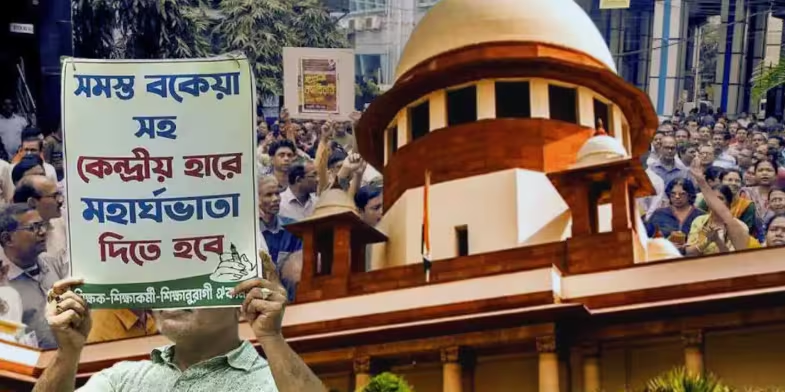.gif)
.gif)

The Supreme Court on Wednesday once again deferred the hearing of the Dearness Allowance (DA) case related to West Bengal government employees. The case, which was scheduled to be heard at 2 PM, could not be taken up due to court constraints. It has now been listed for hearing on Friday. This is the 18th time the matter has been postponed since it reached the apex court.
The matter was initially listed before a bench of Justice Vikram Nath, Justice Sanjay Karol, and Justice Sandeep Mehta. On May 11, the case was reassigned to a new bench comprising Justice Sanjay Karol and Justice Manoj Misra. On Wednesday, it was listed at item number 40, which created uncertainty about whether the hearing would take place. The hearing did not proceed, and the matter was postponed again.
Advocate Bikashranjan Bhattacharyya, representing a section of the government employees, said, “The hearing was scheduled for 2 PM. We were all present. But due to some difficulties in the court, the hearing did not take place. At our request, the hearing has been rescheduled for Friday. We have been assured there will be no further postponement.”
The case relates to the implementation of Dearness Allowance as per the 5th Pay Commission for state government employees. The matter began in the State Administrative Tribunal (SAT), then moved to the Calcutta High Court, and finally reached the Supreme Court in November 2022. The High Court had directed the state to provide DA at the rate of 31%, matching central government levels. The state government challenged this decision in the Supreme Court on November 3, 2022. The first hearing in the apex court took place on November 28, 2022.
Senior advocate Abhishek Manu Singhvi is appearing on behalf of the West Bengal government, while advocates Bikashranjan Bhattacharyya and Firdaus Shamin are representing a section of the employees. Since its filing, the case has been listed before multiple benches due to retirements of judges, including Justices Dinesh Maheshwari and Rishikesh Roy. The last hearing was conducted on December 1, 2024. Despite some interim DA increases announced by the state, the central-equivalent rate remains the core issue under adjudication.